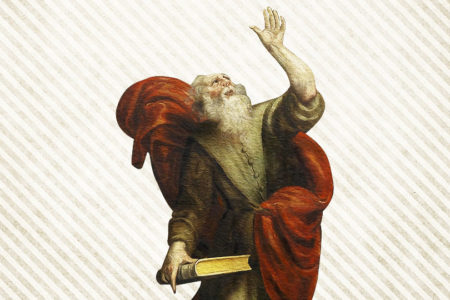Ezekiel’s Strange Signs
Was Ezekiel a paranoid schizophrenic? If not, he must, according to some writers, at least have had an abnormal personality. To lovers of the Bible, such a diagnosis of a biblical prophet is nothing short of blasphemy. On the other hand, it must be acknowledged that Ezekiel engaged in some rather bizarre actions, particularly in the earlier chapters of his book. To what can we attribute behavior such as lying on his left side for 390 days and then on his right side for 40 days (Ezek. 4:48)? This article first examines a proposed theory for Ezekiel’s behavior and then offers some defense of his actions. Finally, it shows the purpose and meaning of Ezekiel’s signs for us today.
As early as 1877, the German scholar, August Klosterman, proposed that Ezekiel suffered from catalepsy—a condition marked by temporary loss of consciousness and rigidity of the body. Klosterman, however, suggested that his illness was an expression of God’s working outside of the prophet’s consciousness. It took Freud’s followers, however, to psychoanalyze the prophet as a severe mental case who only thought he was in contact with God.
In 1946, E. C. Broome published an article entitled “Ezekiel’s Abnormal Personality.” He proposed, on the basis of classic Freudian theory, that Ezekiel’s behavior was symptomatic of a recognizable mental illness, and that illness was consistent with paranoid schizophrenia, marked by periods of catatonia, narcissism, and masochism. Broome concluded, “There can be no doubt we are dealing with a true psychotic capable of great religious insight.”1 One of the so-called evidences of this psychotic behavior was the occasional silence Ezekiel displayed. Consider Ezekiel 3:26: “And I will make thy tongue cling to the roof of thy mouth, that thou shalt be dumb, and shalt not be to them a reprover; for they are a rebellious house” (see also Ezek. 24:27 and 33:22). But Ezekiel’s silence, akin to a form of autism, was the mildest form of his unusual behavior. A survey of these strange actions will provide the basis for this psychiatric diagnosis of Ezekiel. It will also suggest another, saner explanation for the prophet’s deeds.
Most of Ezekiel’s signs or symbolic actions are recorded in chapters 4, 5, 12, and 24. (Please read the biblical text describing the following actions of the prophet.) First, he drew an outline of Jerusalem on a large brick and then played army as he lay siege to the city (4:1–3). Second, he lay for a prolonged period on both sides, as mentioned previously (4:4–8). Third, he ate a strange mixture of foods and grains baked into cakes, using dung as fuel (4:9–17). Fourth, he cut off his hair and burned one-third of it, chopped one-third of it, and scattered the other third to the wind (5:1–4).
Furthermore, for a period of time he packed his belongings on his back in the mornings and acted as if he were moving, while at night he began digging through a wall (12:1–7). He also trembled and shook as he ate his food and drank his water (12:18). Last, but not least, he deliberately did not engage in mourning when his beloved wife died (24:16–18).
While it certainly can be said that Ezekiel’s deeds were a bit strange, must we conclude that he was psychotic? Is this the only explanation for these signs? The following observations should be kept in mind as we meditate on these symbolic actions, which had meaning far beyond the psychological.
First, it is rather presumptive that modern observers dare to speak so confidently about the actions of a man who lived over 2,500 years ago, in a different country and culture, and who obviously does not have the opportunity to respond from the grave to the so-called diagnosis. In these scientific times, we tend to place too much confidence in a person who goes by the title “Doctor.” Omniscience has never been taught as a course in medical school, and infallibility is not an attribute of the medical profession in either its physical or psychiatric branches.
Second, such interpreters deliberately neglect the fact that in each of the above examples, Ezekiel’s actions were directly commanded by God. These maneuvers were not Ezekiel’s ideas, nor were they the creations of an unbalanced mind. They were intended by God to convey His message to the people who witnessed them.
Third, behavior similar to Ezekiel’s is reported in other prophetic books. God commanded Jeremiah to wear a yoke on his neck as a symbol of Israel’s captivity in Babylon (Jer. 27:2; 28:10). Isaiah was commanded to walk naked and barefoot for three years as a sign of judgment on Egypt and Ethiopia (Isa. 20:2–4). Scholars have not felt compelled to regard their behavior as symptomatic of mental pathology. The Book of Ezekiel differs from these other prophetic books basically in the frequency and drama with which such actions are encountered. The symbols are more evident and easier to interpret, but they were all sent by God to be acted out by His messengers.
Fourth, the divine purpose in having His prophet engage in such strange actions was to deliver sign sermons to get the attention of disobedient Israelites who may not have listened to a verbal message. For example, as the people witnessed the family tragedy of Hosea’s adulterous wife and his persevering love for her, they were reminded of their own spiritual adultery and God’s persevering love for them in spite of their sins (see Hos. 2:2; 3:1–2).
While modern preachers may illustrate their sermons with stories, Israel’s prophets often used props and presented their sermons in symbolic actions. Later in his book, Ezekiel was commanded to take two separate sticks and join them in his hands. As he performed this simple illustration, he explained that the two separate kingdoms of Israel and Judah would someday be united in the Messianic Kingdom (37:15–23). A modern parallel is the use of visual aids such as flannelgraph, overhead projectors, and dramatic monologues.
In the same way, Ezekiel’s seemingly strange behavior in the early chapters of his book was intended to get the attention of a jaded Israelite congregation and to graphically communicate a message of judgment to them. The most poignant example was when the Lord told him not to mourn at his wife’s death. The message to Israel through this sign was that they were not to mourn over the fall of their beloved Temple in Jerusalem (24:20–24). In the destruction of that structure, their pride and joy, they would learn that God’s essence is also revealed in His judgment. They did not have to bewail the dead—the doomed Temple—but confess their guilt and recognize the justice of the Lord’s actions.
The prophet so identified with the fate of his people as vicariously to take their suffering on himself and to dramatize their fate in his own agony. Rather than find his behavior peculiar or appalling, we ought to see in it the depths of his commitment to God and to his people and to appreciate the way in which the prophet was bearing the shame that so often accompanied proclaiming God’s Word.2
In reality, it is not so much that Ezekiel performed certain signs for Israel as that he himself was a sign. This is precisely what Ezekiel 24:24 affirms: “Thus Ezekiel is unto you a sign; according to all that he hath done shall ye do, and when this cometh, ye shall know that I am the Lord Gᴏᴅ.” The prophet’s dumbness and the eventual opening of his mouth were signs to the people (24:27). When Ezekiel spoke words of promise after the fall of Jerusalem, he then declared the positive, promise keeping character of God as he had previously preached His holy justice.
No, Ezekiel was not a paranoid schizophrenic. Such diagnoses of biblical personalities tell us more about their authors than they do about the biblical characters. While God has not asked us today to do such bizarre things as he commanded Ezekiel to do, perhaps we can effectively use attention-getting devices, as long as they do not cheapen the gospel. Any legitimate visual aid can be employed if it gets people’s attention and clearly communicates God’s Word. The prophets have something to teach us in this regard.
More important, we must ask ourselves whether the radically different characteristics of our own individual lives catch the attention of the unsaved? Is your life an action sermon that catches the attention of people who otherwise are blind and deaf to God’s truth? Second Corinthians 3:2 declares, “Ye are our epistle, written in our hearts, known and read of all men.” It has been said, “Your life is the only Bible some people will ever read.”
ENDNOTES
- E.C. Broome, “Ezekiel’s Abnormal Personality,” Journal of Bible Literature, 65 (1946), p. 291.
- Raymond Dillard, An Introduction to the Old Testament (Grand Rapids:
Zondervan Publishing, 1994), p. 319.









Thank you. Helps me for my homily I have to give today.
Thank you for making the message on the book of Ezekiel so vivid. The analysis is annointed. More grace unto you.
This was very powerful to me and informational , I have really enjoyed it, thank you for hearing the voice ofGod and sharing with others.
Shelly Barnett